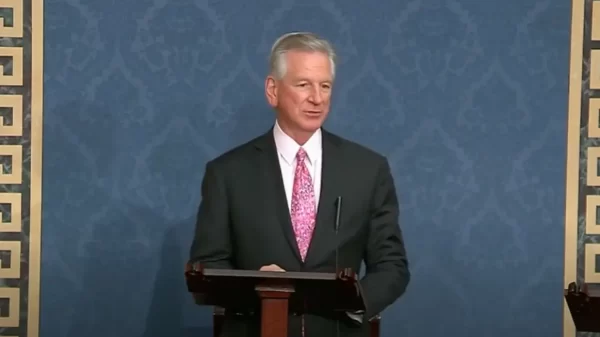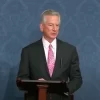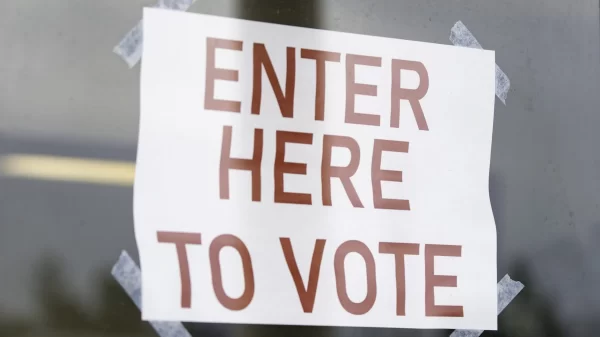Alabama physician and Assistant Secretary for Health Dr. Brian Christine defended a controversial U.S. Department of Health and Human Services study on gender dysphoria in children on Wednesday.
Christine, a urologist who practiced in Homewood, whose appointment to HHS was confirmed by the U.S. Senate in early October, championed the release of a revised version of a study, entitled “Treatment for Pediatric Gender Dysphoria: Review of Evidence and Best Practices,” alongside peer reviews of the report.
A previous version of the study was released in May in response to an executive order signed by U.S. President Donald Trump, entitled “Protecting Children from Chemical and Surgical Mutilation.”
The order, signed January 28, called for HHS to release a review within 90 days of “existing literature on best practices for promoting the health of children who assert gender dysphoria, rapid-onset gender dysphoria, or other identity-based confusion.”
The May version drew criticism from LGBTQ+ advocacy organizations and medical researchers for only including the name of one of its nine writers or independent peer reviews of its findings.
“Today, we released a report exposing the truth: pediatric sex-rejecting procedures are not evidence-based. They are dangerous,” Christine wrote. “Enough is enough. Read it for yourself. Protecting children should not be controversial, it is our duty. The tide is turning.”
In a social media video released Wednesday, Christine described the revised version of the study, which included more than 200 pages of peer reviews from nine academics, as “the most comprehensive review to date of the standard of care for gender dysphoria in minors.”
Alongside the addition of peer reviews, the November version of the study includes the names of all its authors as well as editorial and citation corrections.
Four of the contributing authors are medical doctors, while the remaining hold doctoral degrees in other fields.
“Over the past decade, the number of children and adolescents who reject their biological sex has risen dramatically,” Christine said. “These young people and their families are searching for answers to gender dysphoria. They deserve honesty, compassion and the strongest evidence for the help that the medical profession can offer.”
Christine went on to encourage parents and medical doctors to read the report.
“My message to parents and kids navigating a world mired in confusion and despair is very simple: The prior administration and my predecessor, Rachel Levine, manipulated and betrayed vulnerable families,” he said. “The Trump administration has the wheel now, and we will never, never abandon you.”
“At the Department of Health and Human Services, we will continue to be guided by gold standard science, a dedication to radical transparency and always the truth. That is our commitment to the American people, and it’s my promise, my pledge to you as the assistant secretary for health. Blessings upon you, upon your children and upon our republic,” Christine added.
Christine’s announcement was met with support from U.S. Sen. Tommy Tuberville, R-Ala., who described his statement on gender-affirming care for minors as “spot on” in a Thursday post on X.
“Protecting our children should NOT be controversial,” Tuberville wrote. “‘Gender affirming care’ for minors is DANGEROUS & PURE EVIL.”
Seven original peer reviews from the American Psychiatric Association and additional medical doctors and professors were released by HHS alongside the updated report. Two additional papers analyzing the study, which were published prior to the agency’s call for peer reviews, were also included.
While original peer reviews largely appraised the report’s conclusions positively, the APA wrote that it “fails to address the risk of confirmation bias.”
APA also criticized the study’s reliance on the Cass review, an independent report on gender identity services conducted in the U.K., which “has been criticized by experts for its methodological flaws and biases,” alongside its failure to address findings of the Cass review that “did not support HHS’s conclusions.”
“There is no indication that key stakeholders—namely, transgender individuals, their families, and clinicians – were consulted or that their perspectives were considered,” APA also wrote. “A comprehensive review of best practices would include input from recipients (both those for whom treatment was beneficial, and those for whom it was not), families, and providers of the treatments under evaluation.”
Peer reviewer and postdoctoral researcher at Erasmus MC in the Netherlands, Jilles Smids, and peer reviewer Dr. Richard J. Santen, who respectively described the report and its analyses as “well-argued” and “scientifically sound,” both critiqued the neutrality of the study.
“It is clearly not a neutral report in the sense of merely providing the relevant considerations for and against the current gender affirmative treatment model in the US,” Smids wrote. “It decidedly argues against early medical intervention for [gender dysphoria] in minors.”
“This issue requires thoughtful and in-depth discussion. As this document is not meant to make recommendations, I suggest that the topic be extensively discussed with attention to the pros and cons of this issue,” Santen wrote.
Meanwhile, peer reviewer Dr. Lane Strathearn described the report as “a comprehensive summary of the evidence base for many treatment practices in pediatric gender medicine,” and a review from Dr. Johan C. Bester described the report as “an important and timely work.”
The revised version of the HHS report and its selection of peer reviewers have also received criticism from Kellan Baker, a senior health policy advisor at the Movement Advancement Project.
Baker, who co-authored a paper criticizing the original HHS study, drew attention to a number of the peer reviewers’ prior public opposition to gender-affirming medical care for minors in a statement released by health and medicine publication STAT10.
“They did not engage with anyone with actual clinical expertise in the care of trans youth,” Baker said. “It is a very small loop of people who have already been on record, as they would call themselves ‘skeptics,’—I think it’s fair to call them opponents of care for trans young people.”
The paper co-authored by Baker on the May report was cited in the peer review section of the latest HHS report; however, he said none of its authors were asked to contribute an official peer review.
“They very clearly picked their own reviewers to tell them what they wanted to hear,” he said.
STAT10 reported that, of the peer reviewers, at least two have published prior papers criticizing gender-affirming care practices, while one has co-authored multiple papers with HHS report contributor Moti Gorin.
Of the paper’s nine contributing authors, six have been paid for consulting work, speaking engagements, or for testifying as an expert opposed to forms of gender-affirming care, prior to their contributions to the study.
Gender-affirming care for individuals under the age of 19 was made illegal in Alabama by the Vulnerable Child Compassion and Protection Act, enacted into law in 2022. The state’s ban on gender-affirming care for young people has been enforced since January last year, when a federal appeals court struck down a prior preliminary injunction that temporarily blocked the law’s enforcement.




















































